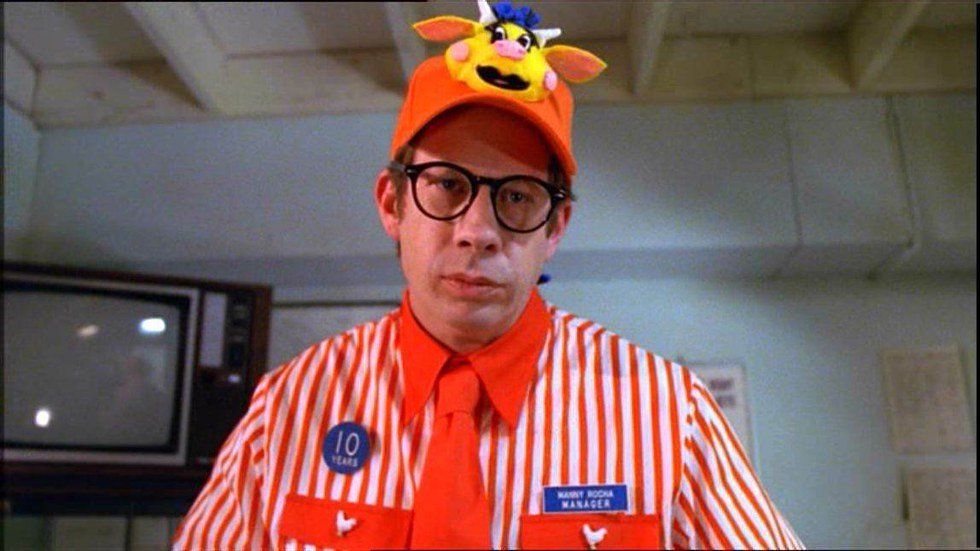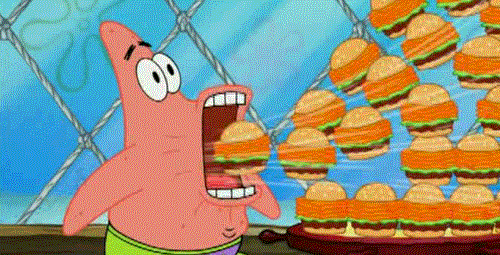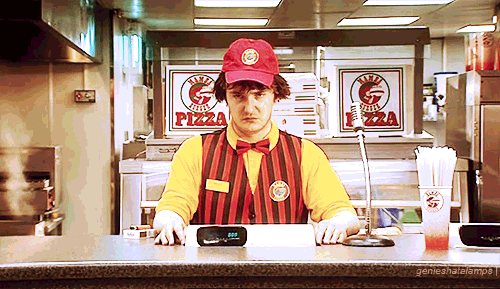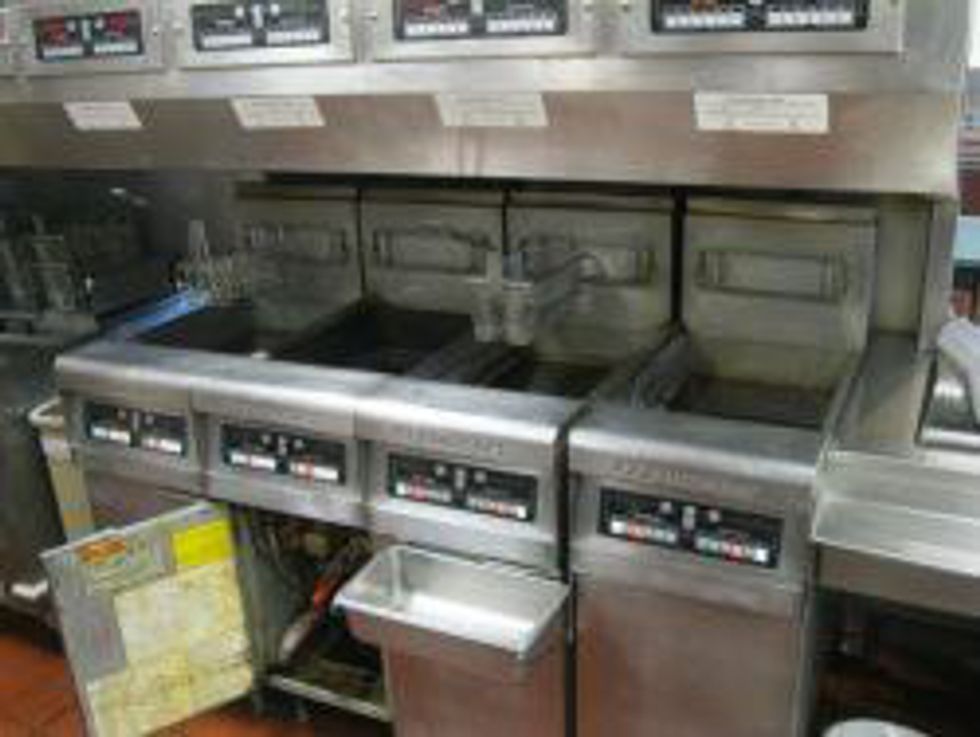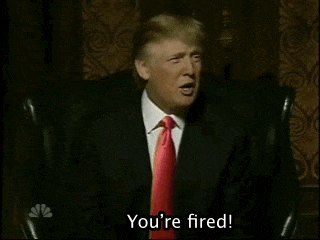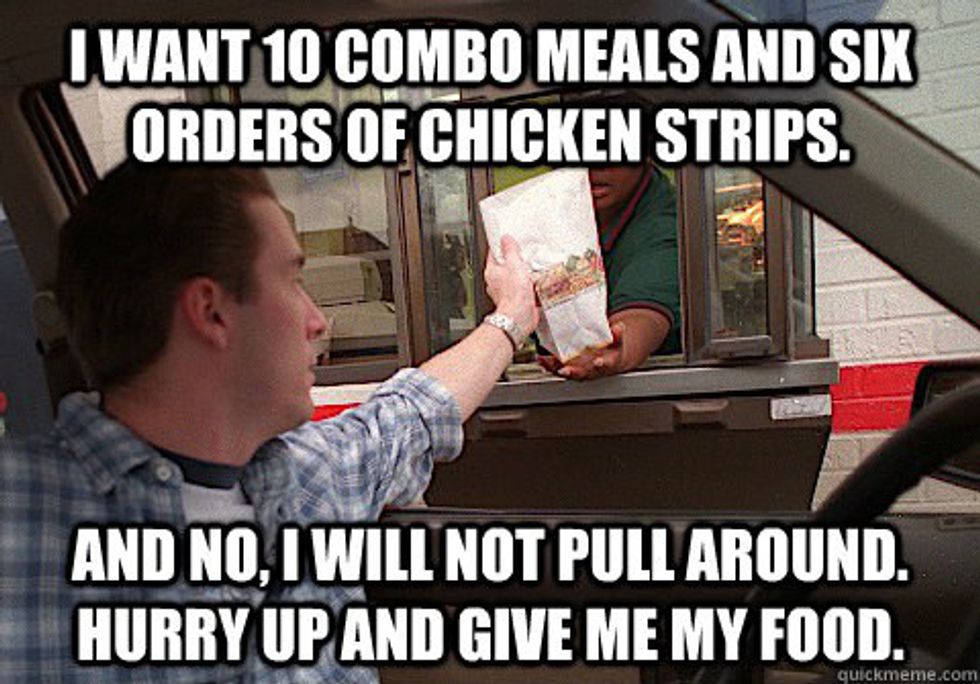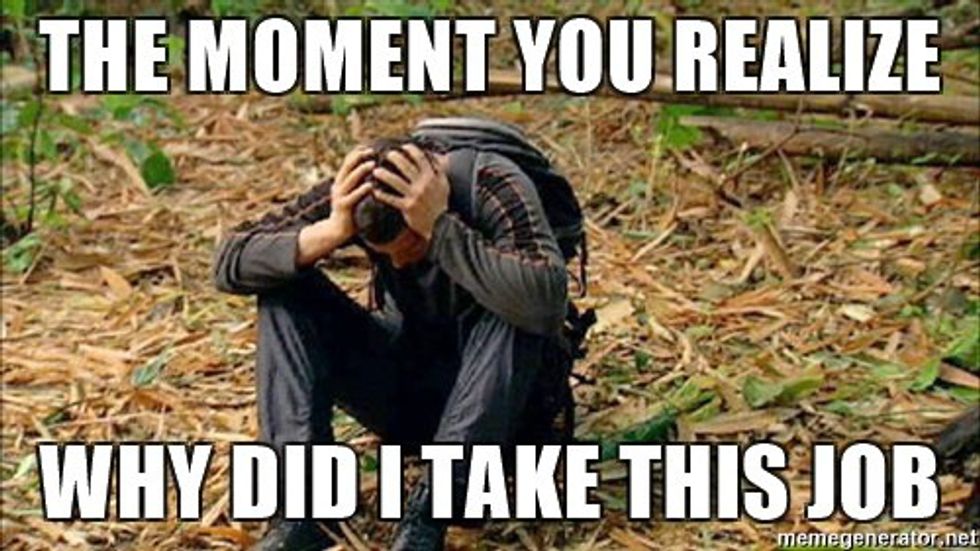While flipping burgers or waiting tables isn't the classiest of jobs, it'll be without a doubt one of the most important points in my career. Of course, I didn't think that way while I worked in fast food. It's a hard industry to work in and it's one that really tests how much you want to keep your job. You start to question what you're doing, why you're here, what kind of sadistic person you were in the past for signing yourself up for this... While everyone has their own experience in the industry, here are the 7.5 questions that all fast food employees will ask themselves while earning $7.50 an hour!
1. Where is all that food they just bought going?
While it's alright to eat every once and a while, fast food isn't something that's healthy when eaten regularly. Most people, knowing this, only order a combo meal or a sandwich to snack on, which is helpful when managing the preparation boards. Limited amounts of food per order make it easy to get orders out in a timely fashion and to reduce mistakes made by employees.
Of course, in an ideal world, only those "regular-sized" orders would happen, but unfortunately, that's not the reality of the situation. In my experience, I've had to prepare a single order that contained 14 hamburger-sized chicken sandwiches, and 6 longer chicken sandwiches. I had an order that was 48 hamburgers large, and I had an order including three triple bacon cheeseburgers that the man ate right in the dining room. Sometimes, you just wonder where all this food is going, and what they're doing with all of it!
2. Why did I agree to take extra hours?
At the end of the day, we're all in fast food for one reason: our paychecks. No matter how many hours you worked, you loved taking home your paycheck on "Paycheck Friday" and feeling pride in all of the money you earned.
Even a better feeling, though, was when you returned home with larger and larger paychecks every week. Since wages are pretty constant in fast food (just above the minimum), and the chances of getting a raise are very low, the only way to really make your paycheck bigger is to work more hours. You'd think, therefore, that people would jump on the opportunity for more hours, but you'd be sadly mistaken.
Typically, these extra shifts happen to be some of the least desirable. Friday night shifts, weekend shifts, and holiday shifts are all high in need for staff, but low in demand from employees to work. Some employees will even LIE to their boss so that they can have their holidays off. It's really difficult to justify taking hours when people will do that sort of thing. Even so, it's important to take the shifts, not only to help your fellow employees out but to help your managers out (and I suppose your paycheck as well). Some employers even give out bonuses for agreeing to take extra shifts. Definitely something worth looking into!
3. Who's going to clean Big Bertha?
Ah, Big Bertha, the device we fast food employees despised. She'd send us home smelling like french fries and grease, and only the few would make it out without burns. NOBODY wanted to deal with Bertha, but somebody had to. She was the reason so many left fast food, and she was always hungry to claim yet another victim.
Big Bertha was our fryer (well, one of four, actually). And while she never actually devoured anyone, the thought of having to clean her actually brought employees to call off for the day. Unfortunately, this burden would usually fall onto the shoulders of a select few (often the same people who would take extra shifts). Frustrated, these employees would often receive other job offers quickly, leaving someone else to take their place. The vicious cycle would continue, and Bertha continues to devour victims to this day.
4. How did [coworker] get fired?
One of the great parts about working fast food is that it exposes you to a lot of different types of people that you wouldn't normally come into contact with. You see everything from ambitious high school students wanting spending money to thrifty college students saving up to pay their tuition to adults that are just having a difficult time financially.
Everyone is from a different background and has different personalities, so some naturally take work more seriously than others. For the most part, everyone gets along pretty well, but more than you'd expect, you'll have a couple troublemakers. In my experience, managers have a pretty good eye at catching who the ringleaders are and estimating how long it'll take before they leave (voluntarily or involuntarily). You'll know when someone gets fired, but the "how?" is often simply left unanswered. It simply tantalizes the minds of the employees for a week and eventually disappears.
5. Why can't I enjoy the snow?
"I'm not missing out on anything"
Probably the hardest days to work back in high school were snow days. On a first instinct, it's exciting to see that school has been closed-finally a taste of freedom from the monotony of the school day! Time to call up your friends to go sledding... Oh wait, you can't. You have work today.
It's just such a bummer to have to work on a day that you just got "off." Sure, you'll get some money for your troubles, but is it really worth missing out on the experience? And don't even get me started on what it's like in the summertime!
6. Why are the customers so crabby?
Let's face it — this question has a pretty obvious answer. When ordering fast food, people are in a hurry. They're not looking for a high-end meal, just something they can shove down their throat for a low cost. It comes as no surprise, then, that customers get a bit impatient when it comes to preparing their meals. Some of this anger is justified, as there are restaurants that are poorly managed and truly don't care about the customer's experience. This is not alright, and it's a problem that corporate needs to take care of. These are the instances in which consumer feedback is so vital.
However, I do have to say that there's some customer frustration that is simply difficult to accept. There are a few items on the menu that we don't have pre-prepared (the most common one at where I worked being mozzarella sticks), so they'll take longer to cook. Similarly, when customers ask for items "straight from the fryer" or "straight from the broiler," they really shouldn't be surprised when it takes so long for their meal to be prepared. Some customers get frustrated if we don't have something in inventory. It's not because we don't want to serve you what you want, but because of when you arrived (typically late at night) relative to our shipments.
For the most part, I think that people understand this, but there are some people that are just beyond reason. I can't help but think about why they became so crabby and what happened to cause them to become that way.
7. Why did I take this job?
To be blunt, fast food isn't going to work out well for everyone. It takes a certain repertoire of time-management skills, the ability to think on your feet, and socialization skills that not everyone can master quickly. There will be times of trial, of frustration. There will be times that you do everything you can to help a customer, but it's thrown back in your face with disgust. There will be times that you'll be yelled at, blamed for things you didn't do, and disrespected. It's hard to keep calm when all of that craziness is happening around you. Is it even worth putting up with all of this?
In the end, you're there to gain experience. A fast food job isn't meant to be a long-term career option, as it's more so the "training wheels" to better-paying positions. To put it succinctly, it's a short term step in a long-term journey. Though the paycheck isn't that nice, the experience will stay with you forever, and for that, I think that taking a fast food job isn't such a bad idea for six months to a year.
7.5. Why am I still here?
Although I'm sure that people of every occupation have this question, I think it's far more pertinent to fast food workers. It's a question of existential dread that I'm sure everyone asks themselves at some point. Why bother working in fast food if my dream job doesn't have anything to do with it?
After having a job for only three months, you really start to get a taste of what it's like to work in the industry. It's tiring-more so than society gives it credit for, and frankly, it is hard work. Nobody wants to come home smelling like a french fry, dealing with crabby customers and getting burns, but hey, someone has to do it. Sure, anyone can do a fast food job, but there's a special set of skills that you can learn from it, no matter how old, educated, or experienced you are. It teaches you grit. It teaches you how to learn from your mistakes. It teaches you how to take responsibility and how to work with people. It teaches you humility, and it teaches you pride.
If you're working in fast food now, I urge you not to give up hope. No matter how hard it is, stay with your job, do it respectfully, and when the time comes, give your employer a courteous two-week leave notice. It would mean the world to your managers, and it will serve you well in the long run. Above all, it's important to remember that there are always other opportunities out there and to not give up the pursuit of what you dream. That end goal is why you currently do what you do, and what will inspire you to take the path to get there.
Did you work in fast food? How was your experience? Leave your responses in the comments below!



